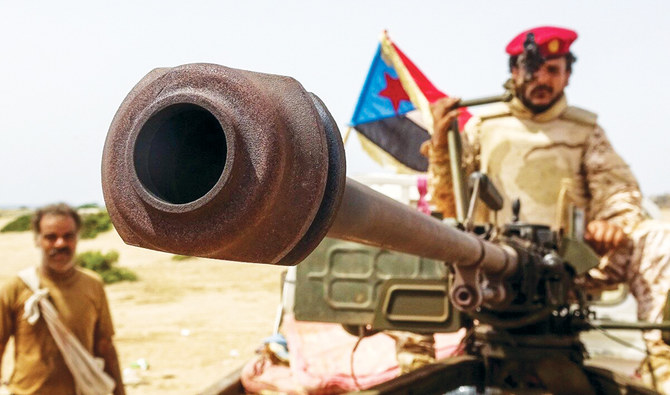AL-MUKALLA: The internationally recognized government of Yemen and the pro-independence, separatist Southern Transitional Council (STC) began withdrawing their forces on Friday from a flashpoint in the southern province of Abyan, military officers from both sides told Arab News.
The latest redeployment of forces from contested areas in southern Yemen is part of the power-sharing Riyadh Agreement, which was designed to end hostilities between the two sides.
Alongside images of Saudi officers supervising the withdrawal of forces, Saudi Arabia's Ambassador to Yemen Mohammed Al-Jaber tweeted on Friday: “Our brave heroes from the Coordination and Political Liaison Team, the leadership and officers of the coalition forces, are hand in hand with the leaders and officers of the legitimate forces and the Southern Transitional Council to implement the agreement.”
Troops were seen on Friday afternoon leaving their positions in the contested Sheikh Salem area — under the supervision of Saudi officers — and heading towards a military base in the government-controlled Lawder district.
“The army has pulled out military units that are not part of the Abyan Axis from Sheikh Salem to Mukayras,” one army officer, who asked to remain anonymous, told Arab News by telephone.
The STC also announced the withdrawal of forces from Sheikh Salem to Aden and the shifting of another military brigade from Aden to Karesh in Lahj, a move that Mohammed Al-Naqeeb, a spokesperson for the STC forces in Abyan, told Arab News was intended to reinforce anti-Houthi forces.
“We are committed to our partnership with the (Arab) coalition and we thank them for their peace efforts,” Al-Naqeeb said, adding that the remaining military forces in Abyan would be withdrawn in phases.
On Thursday, the coalition announced that its forces in southern Yemen would monitor the separation of forces in contested areas in Abyan province and Aden and their redeployment to fight the Houthis.
SPEEDREAD
The latest redeployment of forces from contested areas in southern Yemen is part of the power-sharing Riyadh Agreement, which was designed to end hostilities between the two sides.
Under the Riyadh Agreement, the Yemeni government and STC would form a shared government and pull out of Aden and Abyan. Yemeni President Abed Rabbo Mansour Hadi would appoint a new prime minister and a new governor and security chief for Aden. The implementation of the agreement has been drawn out by political wrangling over which should come first, the announcement of the new government or the withdrawal of forces.
The coalition’s latest statement was widely seen as a major breakthrough in the implementation of the Riyadh Agreement. Once security and military arrangements are agreed, Prime Minister-designate Maeen Abdulmalik Saeed will announce his cabinet, composed of 24 ministers with equal representation from both sides.
In Riyadh, government and STC sources told Arab News on Friday that Saeed has chosen his ministers and will likely announce his new government once military forces have completed their withdrawal.
Yemeni politicians and analysts said that the implementation of the Riyadh Agreement would unite forces against the Houthis and would help overcome issues including crumbling infrastructure and services and a falling currency.
Former prime minister Ahmed Obeid bin Daghr, a senior adviser to the Yemeni president, said he sees serious progress towards the implementation of the Riyadh Agreement. On Thursday, he tweeted: “The Houthis are our common enemy.”
The Houthis have exploited the rift between the Yemeni government and the STC to make territorial gains in several areas. “Since August 2019, efforts against the Houthis have dispersed and the economy has collapsed as important military commanders have been killed in the fighting between the government and the STC,” Yasser Al-Yafae, a political analyst based in Aden, told Arab News.
But Al-Yafae and other analysts predict that the redeployment of forces from Abyan and Aden to fight the Houthis will lead to military success.























